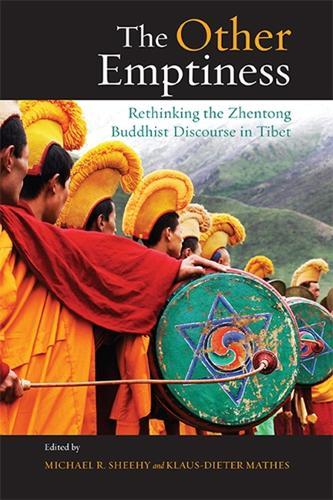Overview
"This book brings together perspectives of leading international Tibetan studies scholars on the subject of zhentong or ""other-emptiness."" Defined as the emptiness of everything other than the continuous luminous awareness that is one's own enlightened nature, this distinctive philosophical and contemplative presentation of emptiness is quite different from rangtong—emptiness that lacks independent existence, which has had a strong influence on the dissemination of Buddhist philosophy in the West. Important topics are addressed, including the history, literature, and philosophy of emptiness that have contributed to zhentong thinking in Tibet from the thirteenth century until today. The contributors examine a wide range of views on zhentong from each of the major orders of Tibetan Buddhism, highlighting the key Tibetan thinkers in the zhentong philosophical tradition. Also discussed are the early formulations of buddhanature, interpretations of cosmic time, polemical debates about emptiness in Tibet, the zhentong view of contemplation, and creative innovations of thought in Tibetan Buddhism. Highly accessible and informative, this book can be used as a scholarly resource as well as a textbook for teaching graduate and undergraduate courses on Buddhist philosophy."
Full Product Details
Author: Michael R. Sheehy ,
Klaus-Dieter Mathes
Publisher: State University of New York Press
Imprint: State University of New York Press
Dimensions:
Width: 15.20cm
, Height: 2.50cm
, Length: 22.90cm
Weight: 0.227kg
ISBN: 9781438477589
ISBN 10: 1438477589
Pages: 400
Publication Date: 02 July 2020
Audience:
General/trade
,
General
Format: Paperback
Publisher's Status: Active
Availability: Available To Order

We have confirmation that this item is in stock with the supplier. It will be ordered in for you and dispatched immediately.
Reviews
"""This anthology is commendable for providing a comprehensive insight into the rarely known alternative version of the Madhyamaka."" — Religious Studies Review ""Highly accessible and informative, this book can be used as a scholarly resource as well as a textbook for teaching graduate and undergraduate courses on Buddhist philosophy."" — New Books Network ""The book contains extremely interesting material and makes a valuable contribution to the study of Tibetan Buddhism. It will be appreciated by those interested in the development of one of the important and yet understudied of its traditions, the other emptiness tradition."" — Georges B. J. Dreyfus, coeditor of The Svātantrika-Prāsaṅgika Distinction: What Difference Does a Difference Make?"
Highly accessible and informative, this book can be used as a scholarly resource as well as a textbook for teaching graduate and undergraduate courses on Buddhist philosophy. - New Books Network The book contains extremely interesting material and makes a valuable contribution to the study of Tibetan Buddhism. It will be appreciated by those interested in the development of one of the important and yet understudied of its traditions, the other emptiness tradition. - Georges B. J. Dreyfus, coeditor of The Svatantrika-Prasangika Distinction: What Difference Does a Difference Make?
"""Highly accessible and informative, this book can be used as a scholarly resource as well as a textbook for teaching graduate and undergraduate courses on Buddhist philosophy."" — New Books Network ""The book contains extremely interesting material and makes a valuable contribution to the study of Tibetan Buddhism. It will be appreciated by those interested in the development of one of the important and yet understudied of its traditions, the other emptiness tradition."" — Georges B. J. Dreyfus, coeditor of The Svātantrika-Prāsaṅgika Distinction: What Difference Does a Difference Make?"
Author Information
Michael R. Sheehy is Director of Scholarship at the Contemplative Sciences Center and Research Assistant Professor in Tibetan Buddhist Studies at the University of Virginia. Klaus-Dieter Mathes is Professor of Tibetan and Buddhist Studies at the University of Vienna, Austria. His books include A Direct Path to the Buddha Within: Gö Lotsāwa's Mahāmudrā Interpretation of the Ratnagotravibhāga and A Fine Blend of Mahāmudrā and Madhyamaka: Maitrīpa's Collection of Texts on Non-conceptual Realization (Amanasikāra).




